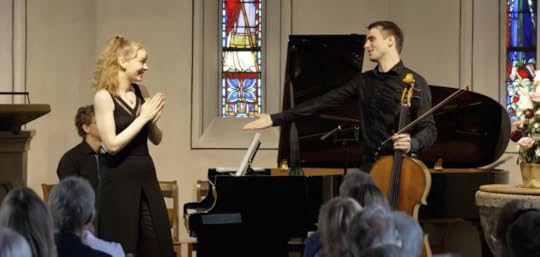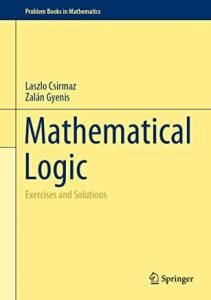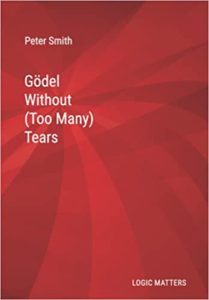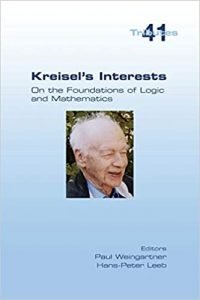Peter Smith's Blog, page 30
August 2, 2022
Jeunes Etoiles

Having just grumpily posted about a disappointing logic book, now for something the very opposite of disappointing …
The Gstaad Digital Festival has been streaming a series of concerts by young musicians, “Jeunes Etoiles”. The latest was a terrific concert by the cellist Friedrich Thiele wonderfully accompanied by Elisabeth Brauss. They played Beethoven’s variations on Mozart’s «Bei Männern, welche Liebe fühlen», Schumann’s Fantasiestücke for Cello and Piano, and five Shostakovich piano Preludes arranged for Cello and Piano followed by his Cello Sonata Op. 40. All the Shostakovich was new to me and I was very taken with the music. All extraordinarily well played to my ears — and as you can see, the performers too seemed really delighted by how the short concert had gone. Here’s a link to them.
The post Jeunes Etoiles appeared first on Logic Matters.
(Another) one to miss …
 If any title in the Cambridge Elements series was especially designed to catch my interest, it would be Theoretical Computer Science for the Working Category Theorist. Not, of course, that I am in any sense a ‘working category theorist’, but I’m certainly interested, and know just a bit. And I know a smidgin too about computability theory. So I should be an ideal reader for an accessible short book which sets out to give more insights as to how the two are related. The introduction notes that there are a number of texts aimed at the computer scientist learning category theory (like the excellent Barr and Wells, Category Theory for Computing Science); but Noson Yanofsky promises something quite different, aimed at someone who already knows the basics of category theory and who wants to learn theoretical computer science.
If any title in the Cambridge Elements series was especially designed to catch my interest, it would be Theoretical Computer Science for the Working Category Theorist. Not, of course, that I am in any sense a ‘working category theorist’, but I’m certainly interested, and know just a bit. And I know a smidgin too about computability theory. So I should be an ideal reader for an accessible short book which sets out to give more insights as to how the two are related. The introduction notes that there are a number of texts aimed at the computer scientist learning category theory (like the excellent Barr and Wells, Category Theory for Computing Science); but Noson Yanofsky promises something quite different, aimed at someone who already knows the basics of category theory and who wants to learn theoretical computer science.
It most certainly didn’t work for me. It just strikes me as very badly written. Careless too. What, for example, are we to make of slapdash remarks like “the German mathematician Georg Cantor showed that sets can be self-referential” or “Kurt Gödel showed that mathematical statements can refer to themselves”? (And on Gödel, I doubt that anyone who isn’t already familiar with the proof of Gödelian incompleteness theorems from the unsolvability of the Halting problem is going to get much real understanding from the discussion on pp. 71–72.)
I could go into a lot more detail, but it would be pretty tedious; and to be honest I found the book far too irritatingly disappointing to want to bother. Your mileage, of course, might vary …
The post (Another) one to miss … appeared first on Logic Matters.
July 31, 2022
PHQ, twenty years on, at East Neuk
 Pavel Haas Quartet 2021 — Photo: Marco Borggreve
Pavel Haas Quartet 2021 — Photo: Marco BorggreveThe Pavel Haas Quartet gave two concerts at the East Neuk festival earlier in the month (Veronika Jarůšková and Peter Jarůšek also played Dvořák trios with Boris Giltburg, to great acclaim). You can now catch up with most of the pieces from the full Quartet’s concerts (the second with Boris Giltburg) in two short programmes on BBC Radio 3, available for a few weeks on BBC Sounds:
Korngold: String Quartet No 3 & Janáček String Quartet No 2 ‘Intimate Letters
The Korngold was a complete revelation to me, and the Dvorak (which they have of course recorded) was as usual a delight. As for their intense Janacek, here is the reviewer for the Edinburgh Music Review:
I have been to perhaps a dozen performances of Janáček’s ‘Intimate Letters’ (Quartet No. 2) over the years, including by the great Smetana Quartet in the RDS in Dublin in the late 70s. I knew that I would be captivated by the music. I read in the programme that the performers had studied with Milan Škampa, the legendary violist of the Smetana Quartet. I knew I was about to hear an informed and technically excellent performance.
I knew nothing. I have no hesitation in stating that the performance of Janáček’s ‘Intimate Letters’ that I had the privilege of experiencing live in Kilrenny on 30th June 2022 was by far the finest performance I have heard, live or otherwise, of this extraordinary work. I am not alone. Walking back to the car after the concert, multiple strangers shared in breathless tones much the same sentiment with me.
And indeed the performance is something very special — though you do need to listen in decent headphones to appreciate the extraordinary dynamic range.
This is the PHQ’s twentieth-anniversary year (and what a journey — of their nine CDs, no less than five won Gramophone awards for the best chamber music disc of the year, and one of these won the overall accolade of CD of the Year). But they sound as fresh as ever. Perhaps because they have had to renew themselves more often than they probably would have liked (in the early years in the second violin position, and then latterly after their founding violist very sadly had to leave because of family illness). But the new violist, Luosha Fang, is surely deeply impressive and I think the quartet has never sounded better. Let’s hope for another more settled period with more recordings to come. And meanwhile I can be thankful again for some of the best concert experiences of my life, and the existing CDs to remember them by.
The post PHQ, twenty years on, at East Neuk appeared first on Logic Matters.
PHQ, twenty years on at East Neuk
 Pavel Haas Quartet 2021 — Photo: Marco Borggreve
Pavel Haas Quartet 2021 — Photo: Marco BorggreveThe Pavel Haas Quartet gave two concerts at the East Neuk festival earlier in the month (Veronika Jarůšková and Peter Jarůšek also played Dvořák trios with Boris Giltburg, to great acclaim). You can now catch up with most of the pieces from the full Quartet’s concerts (the second with Boris Giltburg) in two short programmes on BBC Radio 3, available for a few weeks on BBC Sounds:
Korngold: String Quartet No 3 & Janáček String Quartet No 2 ‘Intimate Letters
The Korngold was a complete revelation to me, and the Dvorak (which they have of course recorded) was as usual a delight. As for their intense Janacek, here is the reviewer for the Edinburgh Music Review:
I have been to perhaps a dozen performances of Janáček’s ‘Intimate Letters’ (Quartet No. 2) over the years, including by the great Smetana Quartet in the RDS in Dublin in the late 70s. I knew that I would be captivated by the music. I read in the programme that the performers had studied with Milan Škampa, the legendary violist of the Smetana Quartet. I knew I was about to hear an informed and technically excellent performance.
I knew nothing. I have no hesitation in stating that the performance of Janáček’s ‘Intimate Letters’ that I had the privilege of experiencing live in Kilrenny on 30th June 2022 was by far the finest performance I have heard, live or otherwise, of this extraordinary work. I am not alone. Walking back to the car after the concert, multiple strangers shared in breathless tones much the same sentiment with me.
And indeed the performance is something very special — though you do need to listen in decent headphones to appreciate the extraordinary dynamic range.
This is the PHQ’s twentieth-anniversary year (and what a journey — of their nine CDs, no less than five won Gramophone awards for the best chamber music disc of the year, and one of these won the overall accolade of CD of the Year). But they sound as fresh as ever. Perhaps because they have had to renew themselves more often than they would have liked (in the early years in the second violin position, and then latterly after their founding violist had to leave because of family illness). But the new violist, Luosha Fang, is surely deeply impressive and I think the quartet has never sounded better. Let’s hope for another more settled period with more recordings to come. And meanwhile I can be thankful again for some of the best concert experiences of my life, and the existing CDs to remember them by.
The post PHQ, twenty years on at East Neuk appeared first on Logic Matters.
PHQ, twenty years on at East Neck
 Pavel Haas Quartet 2021 — Photo: Marco Borggreve
Pavel Haas Quartet 2021 — Photo: Marco BorggreveThe Pavel Haas Quartet gave two concerts at the East Neuk festival earlier in the month (Veronika Jarůšková and Peter Jarůšek also played Dvořák trios with Boris Giltburg, to great acclaim). You can now catch up with most of the pieces from the full Quartet’s concerts (the second with Boris Giltburg) in two short programmes on BBC Radio 3, available for a few weeks on BBC Sounds:
Korngold: String Quartet No 3 & Janáček String Quartet No 2 ‘Intimate Letters
The Korngold was a complete revelation to me, and the Dvorak (which they have of course recorded) was as usual a delight. As for their intense Janacek, here is the reviewer for the Edinburgh Music Review:
I have been to perhaps a dozen performances of Janáček’s ‘Intimate Letters’ (Quartet No. 2) over the years, including by the great Smetana Quartet in the RDS in Dublin in the late 70s. I knew that I would be captivated by the music. I read in the programme that the performers had studied with Milan Škampa, the legendary violist of the Smetana Quartet. I knew I was about to hear an informed and technically excellent performance.
I knew nothing. I have no hesitation in stating that the performance of Janáček’s ‘Intimate Letters’ that I had the privilege of experiencing live in Kilrenny on 30th June 2022 was by far the finest performance I have heard, live or otherwise, of this extraordinary work. I am not alone. Walking back to the car after the concert, multiple strangers shared in breathless tones much the same sentiment with me.
And indeed the performance is something very special — though you do need to listen in decent headphones to appreciate the extraordinary dynamic range.
This is the PHQ’s twentieth-anniversary year (and what a journey — of their nine CDs, no less than five won Gramophone awards for the best chamber music disc of the year, and one of these won the overall accolade of CD of the Year). But they sound as fresh as ever. Perhaps because they have had to renew themselves more often than they would have liked (in the early years in the second violin position, and then latterly after their founding violist had to leave because of family illness). But the new violist, Luosha Fang, is surely deeply impressive and I think the quartet has never sounded better. Let’s hope for another more settled period with more recordings to come. And meanwhile I can be thankful again for some of the best concert experiences of my life, and the existing CDs to remember them by.
The post PHQ, twenty years on at East Neck appeared first on Logic Matters.
July 28, 2022
Mathematical Logic: Exercises and Solutions
 I was about to post another pretty critical book note on two more offerings in the Cambridge Elements series. I’ll still get round to that. But I wouldn’t want you to think that I’m always a relentlessly negative reviewer, would I? — perish the thought! So before I fall back into my usual grumpy groove, let me pause for a positive recommendation of a fairly recent addition to the Springer series ‘Problem Books in Mathematics’.
I was about to post another pretty critical book note on two more offerings in the Cambridge Elements series. I’ll still get round to that. But I wouldn’t want you to think that I’m always a relentlessly negative reviewer, would I? — perish the thought! So before I fall back into my usual grumpy groove, let me pause for a positive recommendation of a fairly recent addition to the Springer series ‘Problem Books in Mathematics’.
Laszlo Csirmaz and Zalán Gyenis have put together a fairly challenging collection Mathematical Logic: Exercises and Solutions (2022). From the Preface:
Problems in this volume have been collected over more than 30 years of teaching undergraduate students Mathematical Logic at Eötvös Loránd University, Budapest. The problems come in great variety: routine applications of a newly introduced technique, checking whether the conditions of a particular theorem are really necessary, extending or finding the limitations of various methods, to amusing puzzles and interesting applications of established results. They range from easy questions and riddles to proving hard theorems when all the necessary ingredients are—hopefully—available.
After preliminary chapters on sets, strategies in games, and formal languages, the main chapters are on recursion theory, propositional calculus, first-order logic, some model theory (Ehrenfeucht–Fraïssé games, quantifier elimination, ultraproducts), and formal arithmetic.
The problems are usually set within the context of reminders of key definitions and theorems, with the occasional hints for solutions: these take 128 pages. Then there about 200 pages of solutions. That page ratio will tell you that the solutions are typically not going to be fully-worked-through answers developed in the sort of detail that (e.g.) a student might be expected to turn in, but rather they are headline indications of the main ideas needed to get a solution (occasionally calling too on background mathematical knowledge). So this is a book, I’d say, better suited for a moderately strong reader, whether a student taking a course or someone self-teaching an area of logic.
Of course, a book like this is likely to reflect the idiosyncrasies and special interests of the authors (so for example, the propositional/predicate logic topics are almost entirely semantically driven — proof theory doesn’t get much of a look in). But such idiosyncrasies are no bad thing — it’s always illuminating to be coming at familiar topics from different angles. Dipping through this book, I have found it very interestingly put together; all but the most expert are surely going to learn from sampling it. So your university library should certainly get a copy.
Of course, there is no point in banging on about the absurdity of Springer publishing such a student-oriented book as a hardback/e-book way out of their price range. (But you needn’t feel too sorry for the impoverished seeker after knowledge, as I’m sure that a PDF will have already found its way to the usual repositories — an eventuality which readers of this blog must of course entirely deplore.)
The post Mathematical Logic: Exercises and Solutions appeared first on Logic Matters.
July 27, 2022
GWT2 — another instalment
 I have now revised three more segments of Gödel Without (Too Many) Tears. I’m still aiming to get a second edition out by the end of October.
I have now revised three more segments of Gödel Without (Too Many) Tears. I’m still aiming to get a second edition out by the end of October.
So here is the whole first third of what will be GWT2, now taking us up to and including the first Interlude. The chapter introducing Peano Arithmetic has been quite significantly revised from the current printed version; the chapter on Quantifier Complexity gets some minor tweaks; and the following Interlude is hardly changed at all. Many thanks once again to David Furcy for corrections and suggestions.
I‘m not entirely sure, as I read through, that I’d write the book quite the same way if I were starting all over again from scratch. But no matter: the plan is to improve the current book, not to write a different one!
The post GWT2 — another instalment appeared first on Logic Matters.
July 26, 2022
Kreisel’s Interests?
College Publications is indeed a decidedly peculiar outfit. On the one hand, they publish a lot of books on logic (broadly construed), and the books appear as very inexpensive print-on-demand paperbacks (excellent!). On the other hand, the quality control seems entirely unreliable, and many books must surely fall more or less stone dead from the press with tiny sales. Moreover, the press seem to make no real effort to spread the word: there is a very amateurish, ill-organized, website which often has only uselessly minimal information about the publications. As far as I can see, there is nothing like e.g. a quarterly newsletter that librarians and the rest of us can sign up for. It’s not surprising then that few of their books seem to end up even in the vast Cambridge university library system.
There are of course successes — for a couple of relatively recent ones, there is the very nice Model Theory for Beginners: 15 Lectures by Roman Kossak (2021), and the good-to-have-in-one-place collected Essays on Set Theory by Akihiro Kanamori (also 2021). So a few days ago in an idle hour, I trawled through the College Publications website to see if I could find anything else published in the last few years that looked sufficiently appealing …
One book that caught my eye was Kreisel’s Interests: On the Foundations of Logic and Mathematics, edited by Paul Weingartner and Hans-Peter Leeb (2020). The advertising blurb says just this:
The contributions to this volume are from participants of the international conference Kreisel’s Interests — On the Foundations of Logic and Mathematics, which took place from 13 to 14 August 2018 at the University of Salzburg in Salzburg, Austria. The contributions have been revised and partially extended. Among the contributors are Akihiro Kanamori, Göran Sundholm, Ulrich Kohlenbach, Charles Parsons, Daniel Isaacson, and Kenneth Derus. The contributions cover the discussions between Kreisel and Wittgenstein on philosophy of mathematics, Kreisel’s Dictum, proof theory, the discussions between Kreisel and Gödel on philosophy of mathematics, some biographical facts, and a collection of extracts from Kreisel’s letters.
Which certainly isn’t very informative, but was enough to pique my interest, and I sent off for a copy (at that point offered at a large discount by Amazon — I suspect they had an already-printed copy they wanted to offload!).
 A grave disappointment. Working backwards, this short book ends with some fifty pages consisting on short snippets taken from letters from Kreisel to Kenneth Derus (or letters to others which Kreisel copied to Derus). The snippets are mostly from five to ten lines long: there are some fun gossipy remarks about a wide cast of characters — but not much logic. This is preceded by a twenty-five page piece by Dan Isaacson, ‘Georg Kreisel: Some Biographical Facts’. But this is all about Kreisel before 1950, i.e. before his first publications. We learn a bit about his early interests, his early contact with Wittgenstein, his war work, his return to Cambridge and his developing interests; there are hints, not really worked out, that Kreisel’s project of trying to extract from finitist content from non-finitist proofs was inspired by Wittgenstein. But there is little to delay us here.
A grave disappointment. Working backwards, this short book ends with some fifty pages consisting on short snippets taken from letters from Kreisel to Kenneth Derus (or letters to others which Kreisel copied to Derus). The snippets are mostly from five to ten lines long: there are some fun gossipy remarks about a wide cast of characters — but not much logic. This is preceded by a twenty-five page piece by Dan Isaacson, ‘Georg Kreisel: Some Biographical Facts’. But this is all about Kreisel before 1950, i.e. before his first publications. We learn a bit about his early interests, his early contact with Wittgenstein, his war work, his return to Cambridge and his developing interests; there are hints, not really worked out, that Kreisel’s project of trying to extract from finitist content from non-finitist proofs was inspired by Wittgenstein. But there is little to delay us here.
So that just leaves the preceding 86 pages of the book. There is a short piece by Göran Sundholm on Kreisel’s Dictum’. You’ll recall that Dummett attributes to Kreisel the thought that “the point is not the existence of mathematical objects but the objectivity of mathematical truth”. Sundholm notes that while Dummett attributes a variety of versions of this remark to Kreisel, none of them are to be found clearly stated in Kreisel’s writings. And Sundholm reports that when he directly asked Kreisel, he didn’t endorse any of the Dummettian versions. There follow a few pretty unclear pages on what the dictum might come to.
Quite out of place in this book, there is a very technical paper by Ulrich Kohlenbach, with the not-very-inviting title ‘Local Formalizations in Nonlinear Analysis and Related Areas and Proof-Theoretic Tameness’. I didn’t get anything at all out of this: but expert proof-theorists can read the paper here and judge for themselves.
That leaves us with just two remaining papers. The two volumes of Gödel’s Collected Correspondence don’t feature exchanges with Kreisel, as he wouldn’t give permission to use the letters. Charles Parsons was one of the editors of Gödel’s Correspondence and, although he does not say so, I imagine that his paper here on ‘Kreisel and Gödel’ was based on work done in preparing those volumes which at the time came to nothing. So now we do get brisk outlines of the preserved exchanges. But there is a tantalizing lack of detail. For example we are told that Gödel in a letter to Kreisel refers to his (Gödel’s) Russell paper but then adds remarks about intuitionism which aren’t in the paper. But we get just a one-sentence hint of their gist. A perhaps slightly frustrating read, then. (Parsons, though, does reproduce in full a rather odd final letter from Kreisel to Gödel.)
Finally, the book starts with a piece by the indefatigable Akhiro Kanamori, on ‘Kreisel and Wittgenstein’. There’s an early period, in which the impressionable undergraduate Kreisel is befriended by Wittgenstein, and becomes a companion for walks. Some seeds are sown here by Wittgenstein’s rather constructivist inclinations. Then middle Kreisel, so to speak, famously reviews Wittgenstein’s Remarks on the Foundations of Mathematics in a highly critical way (“it seems to be a surprisingly insignificant product of a sparkling mind”). Later Kreisel is somewhat more nuanced in his responses to Wittgenstein on logic and mathematics — though I’m not sure I got from Kanamori a very clear picture of Kreisel’s later view of Wittgenstein (though maybe there wasn’t a determinate view there to be clearly pictured).
Anyway, Kanamori’s was the piece in Kreisel’s Interests that interested me the most (though, frankly, that wasn’t a difficult competition to win). Again you can read the paper without buying the book, as it is available here.
A footnote. One thing I learnt from Kanamori’s references is that Piergiorgio Odifreddi has edited some of Kreisel’s non-technical writings About Logic and Logicians into two substantial volumes. These include previously unpublished lecture notes, journal papers, biographical memoirs, etc. It says in the preface “Kreisel himself wrote all the texts, but Odifreddi has made some substantial editorial interventions, rearranging some of the material, breaking the text into sections and paragraphs, inserting titles, moving or removing some notes, and eliminating some digressions.” The result is readable and often engaging. The collection itself doesn’t seem to have been conventionally published; but drafts of the two volumes are available online here.
The post Kreisel’s Interests? appeared first on Logic Matters.
July 20, 2022
Too darn hot
Two ridiculously hot days. It reached 39.9° in Cambridge yesterday (that’s 103.8°F). Not fun. Fortunately, with an older house, some north-facing rooms, strict adherence to the rules about closing windows/blinds/curtains, we were able to keep much cooler indoors. But it was a great relief to get outside into a much more temperate morning today and walk by the river.
But it was too darn hot for Logic Matters. Siteground, who host us, use servers provided by Google Cloud. The cooling system for the Google data centre in London failed yesterday, and the servers went down. The outage lasted 16 hours for Logic Matters. The logical world coped, I’m sure. But there were a lot of very annoyed/worried businesses, hotels, care providers … A burning straw in an over-heated wind of change.
Yes, too darn hot, as Ella Fitzgerald sings …
The post Too darn hot appeared first on Logic Matters.
July 17, 2022
GWT2 — a third instalment
 I was prompted to start working on a second edition of Gödel Without (Too Many) Tears by discovering that there was a significant muddle in Chapter 5 (I had inconsistently wavered between taking Baby Arithmetic, so called, as having just a negation connective, and having other connectives too). Thanks again to Ben Selfridge for pointing out that embarrassing glitch.
I was prompted to start working on a second edition of Gödel Without (Too Many) Tears by discovering that there was a significant muddle in Chapter 5 (I had inconsistently wavered between taking Baby Arithmetic, so called, as having just a negation connective, and having other connectives too). Thanks again to Ben Selfridge for pointing out that embarrassing glitch.
This new instalment of GWT2 corrects that unfortunate mess, and makes a number of other small improvements for clarity/readability, in what is now numbered as Chapter 6. So here it is!
To save readers having to dart between different PDFs, I have included the revised versions of the Preface and earlier chapters (with only trivial changes from the previous posting).
Need I say it? No: but I still will! Corrections and friendly suggestions are immensely welcome at this stage.
The post GWT2 — a third instalment appeared first on Logic Matters.



